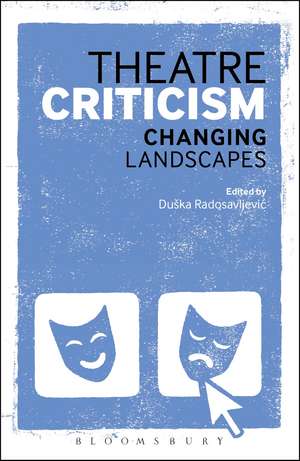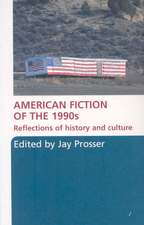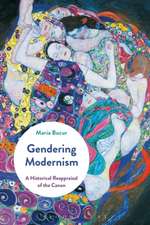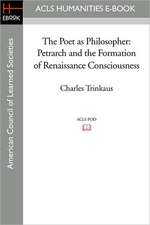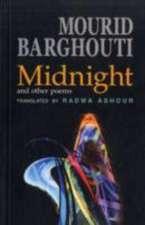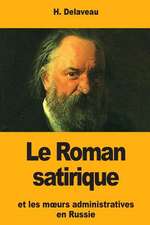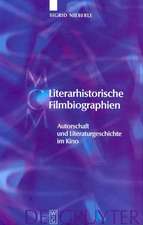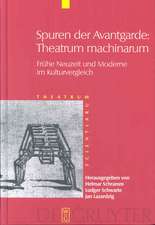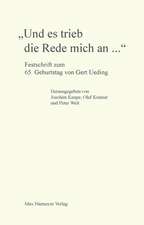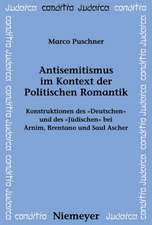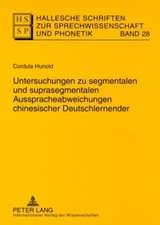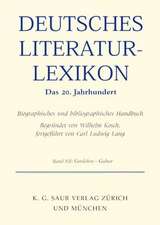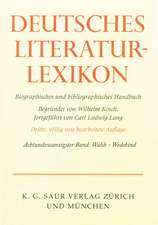Theatre Criticism: Changing Landscapes
Duška Radosavljevicen Limba Engleză Paperback – 7 sep 2016
| Toate formatele și edițiile | Preț | Express |
|---|---|---|
| Paperback (1) | 179.98 lei 6-8 săpt. | |
| Bloomsbury Publishing – 7 sep 2016 | 179.98 lei 6-8 săpt. | |
| Hardback (1) | 539.10 lei 6-8 săpt. | |
| Bloomsbury Publishing – 7 sep 2016 | 539.10 lei 6-8 săpt. |
Preț: 179.98 lei
Preț vechi: 208.33 lei
-14% Nou
Puncte Express: 270
Preț estimativ în valută:
34.44€ • 35.96$ • 28.50£
34.44€ • 35.96$ • 28.50£
Carte tipărită la comandă
Livrare economică 04-18 aprilie
Preluare comenzi: 021 569.72.76
Specificații
ISBN-13: 9781472577092
ISBN-10: 1472577094
Pagini: 352
Dimensiuni: 129 x 198 x 24 mm
Greutate: 0.41 kg
Editura: Bloomsbury Publishing
Colecția Methuen Drama
Locul publicării:London, United Kingdom
ISBN-10: 1472577094
Pagini: 352
Dimensiuni: 129 x 198 x 24 mm
Greutate: 0.41 kg
Editura: Bloomsbury Publishing
Colecția Methuen Drama
Locul publicării:London, United Kingdom
Caracteristici
The editor is lecturer in Drama and Theatre Studies at the University of Kent; winner of the 1998 Harold Hobson Sunday Times Student Drama Critic Award; has worked as an arts critic for The Stage; and has been a dramaturg and education practitioner with various professional theatre companies
Notă biografică
Duska Radosavljevic is Lecturer in Drama and Theatre Studies at the University of Kent. In 1998 she won the Harold Hobson Sunday Times Student Drama Critic Award and has written hundreds of theatre, dance and comedy reviews for the Stage Newspaper. She has also worked as the Dramaturg for the Northern Stage Ensemble and as an education practitioner at the Royal Shakespeare Company. She is the author of Theatre-Making: Interplay Between Text and Performance in the 21st Century and the editor of The Contemporary Ensemble: Interviews with Theatre-Makers. She has also contributed articles and book chapters to four Bloomsbury Methuen Drama edited collections.
Cuprins
Contents:Duska Radosavljevic - Theatre Criticism: Changing LandscapesI Contexts and Histories of Theatre CriticismGeorge Hunka - Style Versus Substance: American Theatre Criticism Since 1945Valda Cakare - The Problem of Reliability: Theatre Criticism in LatviaSavas Patsalidis - From the Uncritical Certainties of Modernism to the Critical Uncertainties of Postmodernism: Reviewing Theatre in GreeceKristina Matvienko - Russian Theatre Criticism: In Search of Contemporary RelevanceMargherita Laera - How to Get Your Hands Dirty: Old and New Models of 'Militant' Theatre Criticism in ItalyVasco Boenisch - What German Theatre Critics Think and What Their Readers Expect: An Empirical Analysis of MisunderstandingsAndrew Haydon - A Brief History of Online Theatre Criticism in EnglandII Critics' VoicesMark Fisher - Do They Mean Me? A Survey of Fictional Theatre CriticsMark Brown - Between Journalism and Art: The Location of Criticism in the Twenty-First CenturyJill Dolan - Code-Switching and Constellations: On Feminist Theatre CriticismMaddy Costa - The Critic as Insider: Shifting UK Critical Practice Towards 'Embedded' Relationships and the Routes This Opens Up Towards Dialogue and DramaturgyIII Changing Forms and Functions of CriticismDiana Damian Martin - Criticism as a Political EventMatthew Reason - Conversation and Criticism: Audiences and Unfinished Critical ThinkingMichelle MacArthur - Crowdsourcing the Review and the Record: A Collaborative Approach to Theatre Criticism and Archiving in the Digital AgeNatasa Govedic - Articism (Art + Criticism) and the Live Birds of Passionate ResponseWilliam McEvoy - Performative Criticism and Creative Critical WritingIV Samples of Critical PracticeAlison Croggon - How to Think Like a Theatre CriticOpen Dialogues - NOTAAlice Saville - HuffMegan Vaughan - Teh Internet is a Serious Business
Recenzii
This is the perfect source book for degree courses that cover theatre criticism either as a practical subject or as a subject for literary analysis, that looks at the subject from several different perspectives to provide plenty of material for discussion.
If you have the slightest interest in what's in these pages and how it gets here, you really have to read Theatre Criticism: Changing Landscapes ... in its 300-plus pages you will find much valuable information, some passionate writing, and much to argue about.
An unparalleled work for those who are curious about what might be the new methods and changing perspectives in current theatre criticism, and what we perform while writing and thinking on theatre . Radosavljevic's work is significant as a pioneering action, as it shows that understanding the world is just a radical and critical change of perspective.
[T]he volume's significance lies precisely in its ability to activate concerns and reflection on what it means to practice theatre criticism or to engage in it as a reader at a time when all the realities of theatre, theatre criticism and readership are being reconceptualized, reconfigured and resignified. Because of its functionality as well as its timeliness, Theatre Criticism is a fascinating volume for anyone even remotely interested in understanding the "changing landscapes" of twenty-first-century culture.
If you have the slightest interest in what's in these pages and how it gets here, you really have to read Theatre Criticism: Changing Landscapes ... in its 300-plus pages you will find much valuable information, some passionate writing, and much to argue about.
An unparalleled work for those who are curious about what might be the new methods and changing perspectives in current theatre criticism, and what we perform while writing and thinking on theatre . Radosavljevic's work is significant as a pioneering action, as it shows that understanding the world is just a radical and critical change of perspective.
[T]he volume's significance lies precisely in its ability to activate concerns and reflection on what it means to practice theatre criticism or to engage in it as a reader at a time when all the realities of theatre, theatre criticism and readership are being reconceptualized, reconfigured and resignified. Because of its functionality as well as its timeliness, Theatre Criticism is a fascinating volume for anyone even remotely interested in understanding the "changing landscapes" of twenty-first-century culture.
